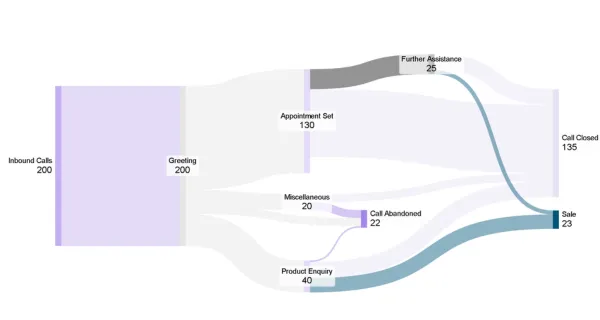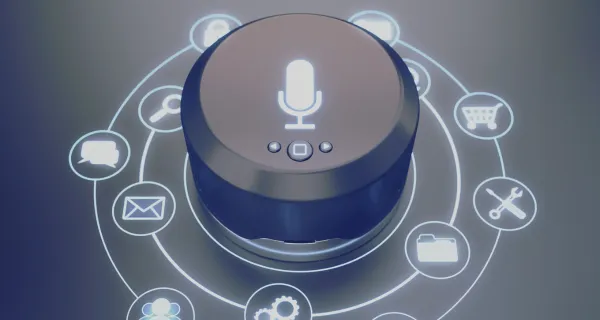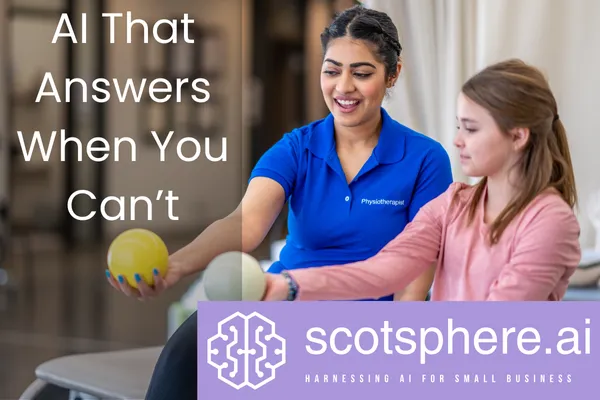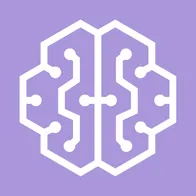How we do it
We provide conversational AI solutions that work smoothly with your existing business systems. Our architecture—built on telephony, AI voice capabilities, knowledge management, API integrations, analytics, and low-code automation—enables businesses to deliver quality customer experiences consistently and for us to deploy them very quickly.

Telephony and Messaging Integration
Our platform features a comprehensive telephony and messaging system supporting voice calls, SMS, and messaging services including the like of WhatsApp and Slack.
This enables businesses to connect with customers through their preferred communication channels.
The integration handles both inbound and outbound communications, facilitating timely engagement and better customer experiences.
AI-Powered Voice Interactions
We integrate conversational AI technology to improve voice-based exchanges. This system interprets spoken language, enabling fluid conversations between users and AI agents.
Using dedicated API connections to low latency voice processing services, it provides prompt responses and coherent user experiences, making interactions more contextual and effective.


Human-Like Speech for Natural Conversations
To enhance the clarity and expressiveness of AI-generated speech, our solution incorporates industry-leading text-to-speech capabilities.
This technology delivers highly natural and human-like voice synthesis,
supporting multiple languages and voice styles to cater to diverse customer
needs.
Whether engaging in casual conversation or delivering complex responses, the AI agent ensures clarity, warmth, and professionalism in every interaction.
Knowledge-Driven Interactions
A key component of our platform a dynamic knowledge base, which aggregates and structures information from various sources, including FAQs, product documentation, websites and customer records. This allows AI agents to retrieve relevant details quickly and accurately when responding to customer inquiries. Additionally, these knowledge bases can be programmed to query dynamic data sources, such as CRM systems or proprietary databases, ensuring that the AI agent delivers real-time, personalized responses.
By leveraging this structured knowledge, businesses can provide their customers with instant, precise answers while ensuring consistency in communication across all interactions.


API-Enabled Integration with Business Systems
Our platform connects with external business systems for real-time data access and management. When receiving a call, the AI agent can access the caller's customer profile, enabling personalized service. Integrations include:
CRM Systems – Access and update customer profiles in systems like Oracle Fusion Cloud or Microsoft Dynamics 365
Order/Inventory Management – Provide updates on order status and product availability
Billing/Payment Platforms – Handle invoice questions and process payments
Scheduling Tools – Manage appointments and deliver reminders
Call Analysis for Continuous Improvement
To ensure ongoing enhancement of AI agent performance, our platform incorporates powerful call analysis tools.
AI-Based Call Evaluation – A native assessment model utilizes a large language model (LLM) as a judge to evaluate conversation effectiveness. This system provides structured feedback on AI-generated responses, helping refine conversation flow and accuracy.
External Call Analysis Tools track interaction patterns, assess customer sentiment, and generate insights for optimization. These tools offer a detailed view of caller journeys, highlighting areas for improvement and identifying opportunities for better engagement.
By continuously monitoring and refining AI interactions, businesses can ensure high-quality, reliable customer service.


Workflow Automation with Low-Code/No-Code Integration
Our low-code / no-code automation tools connect AI agents with third-party applications, enabling:
CRM Data Synchronization – Syncing customer data between systems like Oracle Fusion Cloud and Microsoft Dynamics
Multi-Channel Marketing – Triggering email follow-ups in Mailchimp or creating customer segments in HubSpot
Support Ticket Management – Generating cases in Zendesk or follow-up tasks in Salesforce Service Cloud
Process Automation – Sending conversation summaries to Slack or creating project tasks in Asana
Read Our Blog Posts

Agentic Voice AI Is Having Its Breakout Moment — and Scottish SMEs Are Perfectly Placed to Lead It
Agentic Voice AI Is Having Its Breakout Moment — and Scottish SMEs Are Perfectly Placed to Lead It
Voice technology has matured beyond virtual assistants and IVRs. The next wave — agentic voice AI — is intelligent, proactive, and already reshaping how small businesses connect with customers.
In 2024, talking to a machine is no longer novel.
We’ve all interacted with voice systems — from Siri and Alexa to clunky customer service menus. But for businesses, the real promise of voice AI has been harder to pin down.
According to a recent Gartner report, the industry is finally crossing that threshold. Voice AI is no longer just a passive tool that listens and replies. It's becoming agentic — able to understand context, make decisions, and act on behalf of a business. The potential impact is profound, especially for SMEs operating with lean teams, high customer volumes, and limited admin bandwidth.
“Voice AI is moving from a reactive channel to a proactive partner,” the report states, citing agentic systems’ ability to handle multistep tasks, update external systems, and even orchestrate follow-up actions across channels.
This evolution opens the door for something previously out of reach for many small businesses: a responsive, intelligent front desk that never sleeps, never forgets, and always answers.
A UK Market That’s Ready — But Underserved
While the US market has seen aggressive uptake of voice AI in sectors like e-commerce and healthcare, the UK has lagged slightly — not due to lack of interest, but lack of fit.
“A lot of AI tools are built for the American enterprise model,” says Antony Slack, founder of Edinburgh-based startup scotsphere AI. “They’re powerful, but they assume you’ve got tech teams, big budgets, and the appetite for complexity.”
Slack’s company is part of a growing cohort of UK-based innovators responding to that gap — building voice-first platforms tailored to small business realities.
His team focuses on service-based sectors: law firms, clinics, tradespeople — the kinds of businesses that rely on inbound calls to drive revenue but often miss them because they’re doing the work itself.
From Listening to Acting: The Rise of Agentic AI
Traditional voice systems (think IVR menus or voice-to-text tools) function as digital notetakers. Agentic AI, by contrast, acts.
scotsphere AI’s platform can:
Answer calls in real time
Understand the nature of a customer enquiry
Book appointments directly into calendars
Update CRMs or booking systems
Escalate complex queries to a human when needed
And it does all this with natural, human-like speech, trained to reflect UK tone and pacing.
“We’ve moved beyond ‘Press 1 for bookings,’” Slack explains. “Our voice agents can handle nuanced conversations and follow through on real-world tasks — just like a staff member would.”
Why Inbound Calls Are Still Critical for SMEs
According to scotsphere AI’s own Analysis, missed inbound calls represent a consistent and preventable source of lost revenue across UK SMEs.
In law firms, for example, 45–60% of new business comes via phone enquiry. For salons and trades, that number can be even higher.
But owners often don’t answer — not because they don’t want to, but because they can’t. They’re with clients, in meetings, completing mandatory training, on-site, or simply unavailable.
“It’s not about replacing people,” he says. “It’s about making sure no lead goes unanswered.”
Why Customisation and Integration Matter
Gartner’s report also notes a key limitation of earlier voice AI platforms: siloed experiences.
“Without integration into external systems,” the analysts write, “voice AI can feel like a dead end.”
scotsphere’s team took that lesson to heart. Their platform is built to integrate with:
Google Calendar and Microsoft 365
Clio (for legal)
Fresha (for salons and clinics)
Bespoke booking and CRM systems
What this means for the business owner: calls aren’t just answered — they’re actioned. Bookings are confirmed. Data is logged. The customer journey continues, even without staff intervention.
Built in Scotland, for British Business
There’s a cultural dimension too.
“The tone, the phrasing, the expectations of politeness — UK callers notice when something sounds ‘off,’” Slack notes.
That’s why scotsphere AI is investing heavily in voice training data and conversational modelling. The goal is to make interactions feel local, warm, and personal — even when handled by an AI.
With development anchored in Scotland, the company also brings a regional sensitivity often missing in global platforms.
What's Next for Voice AI in the UK?
Gartner projects that by 2026, over 30% of customer service will be handled by conversational AI — up from 15% in 2023.
But Slack believes the real tipping point will come not from enterprise adoption, but from small business success stories.
“When the local solicitor starts winning more clients because they never miss a call…
When the salon owner sees no-shows drop because their AI confirms bookings in real time…
That’s when you’ll see mass adoption.”
For many SMEs, voice AI won’t be a novelty — it’ll be a necessity. And platforms like scotsphere AI are making sure it’s ready when they are.

Navigation
Contact Us
© 2025 scotsphere.ai All Rights Reserved
